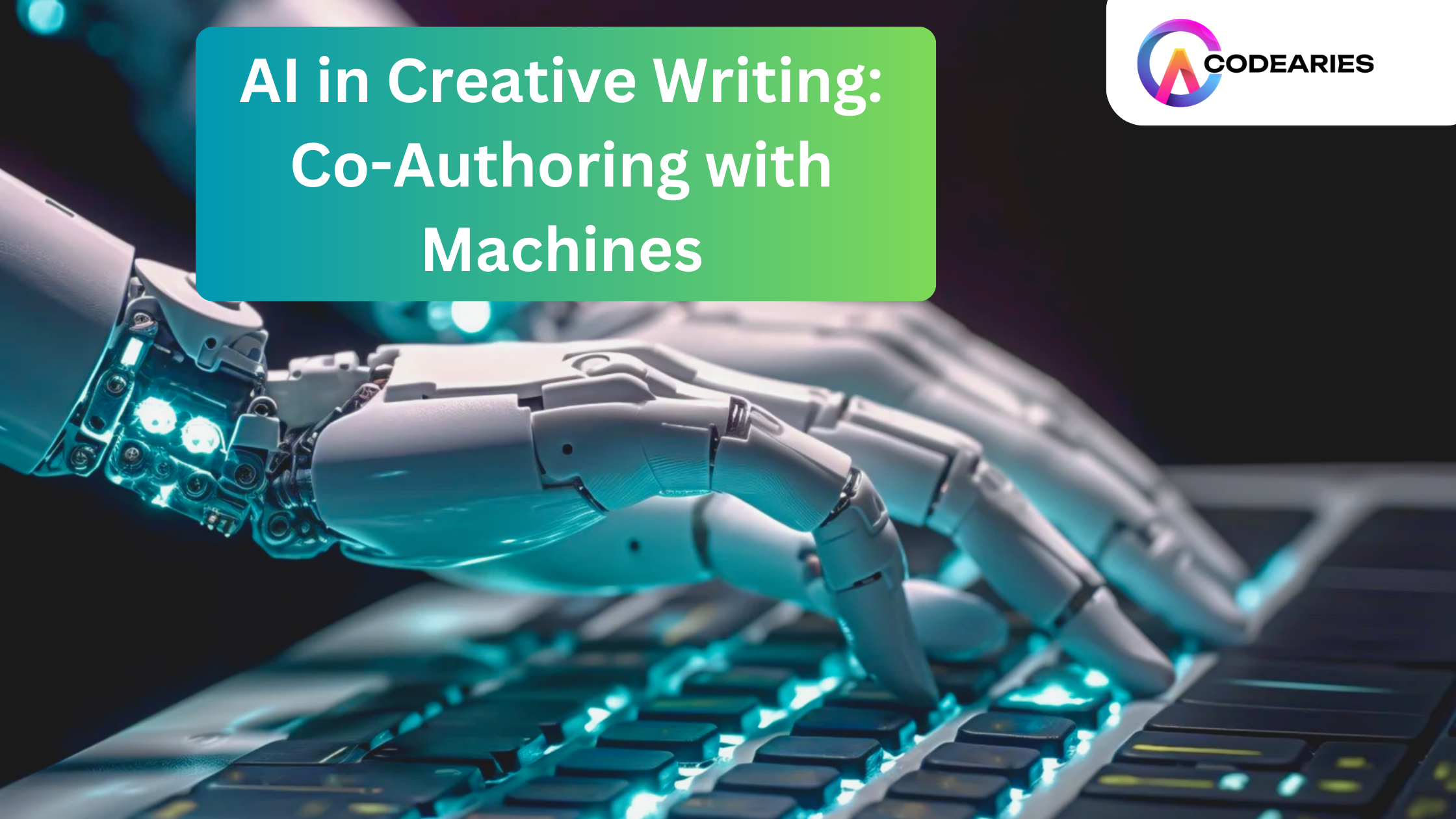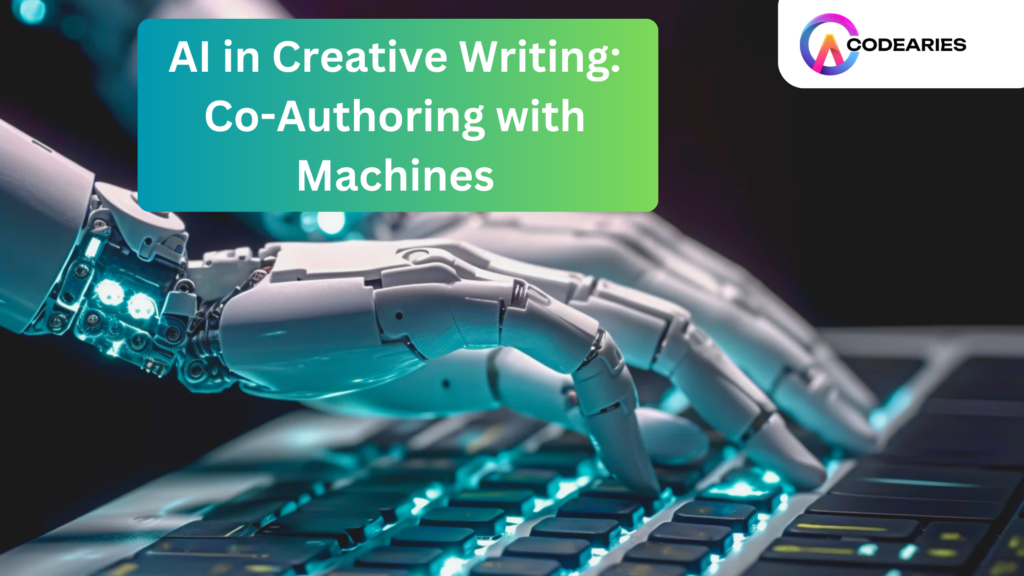
AI in Creative Writing: Co-Authoring with Machines

Introduction
In the age of digital transformation, Artificial Intelligence (AI) is redefining the landscape of numerous industries, and creative writing is no exception. The fusion of AI with creative writing is not just a futuristic concept but a present reality, enhancing the way stories are crafted, assisting authors, and creating interactive narratives that captivate audiences. This well researched blog will dive into the intricate world of AI in creative writing, exploring its applications, benefits, future trends, and the ethical considerations that accompany this technological evolution.
Overview of AI in Creative Writing
AI’s Role in Creative Writing
AI in creative writing involves the use of algorithms and machine learning models to generate content, assist writers, and enhance the creative process. These AI systems can produce coherent narratives, suggest plot twists, and even mimic the writing style of famous authors. The integration of AI in creative writing ranges from simple text generation to complex story development, providing a unique blend of human creativity and machine precision.
Historical Context and Evolution
The journey of AI in creative writing dates back to the early days of computer science when researchers experimented with rule-based systems to generate poetry and prose. With the advent of machine learning and natural language processing (NLP), AI has evolved to understand and generate human-like text, paving the way for advanced writing tools and platforms.
Examples of AI Writing Tools and Platforms
1. GPT-3 by OpenAI
GPT-3, or Generative Pre-trained Transformer 3, is one of the most advanced AI language models developed by OpenAI. It can generate text based on prompts, assist in story development, and even mimic various writing styles. GPT-3’s ability to produce human-like text has made it a valuable tool for writers seeking inspiration or assistance in their creative process.
Example: A writer can input a brief story outline into GPT-3, and the AI will generate a detailed narrative, complete with character development and plot twists.
2. AI Dungeon
AI Dungeon is an interactive storytelling platform that uses AI to create immersive text-based adventures. Users can input commands, and the AI generates responses, allowing for a dynamic and engaging narrative experience. This platform exemplifies the potential of AI in creating interactive and personalized stories.
Example: A user can start a fantasy adventure by describing a setting, and AI Dungeon will craft a unique story based on their inputs, adapting to their choices in real-time.
3. Sudowrite
Sudowrite is an AI-powered writing assistant designed to help authors overcome writer’s block and enhance their creative process. It provides suggestions for plot development, character interactions, and even helps with editing and refining prose.
Example: An author struggling with a scene can use Sudowrite to generate dialogue options, describe settings, or suggest plot directions, streamlining the writing process.
4. Jasper (formerly Jarvis)
Jasper is an AI content creation tool that helps writers generate high-quality content quickly. It can be used for various writing tasks, including blog posts, marketing copy, and creative writing. Jasper leverages advanced NLP techniques to produce coherent and engaging text.
Example: A blogger can use Jasper to generate topic ideas, draft articles, and optimize content for SEO, significantly reducing the time and effort required for content creation.
Benefits for Writers and Content Creators
1. Overcoming Writer’s Block
AI writing tools can provide fresh ideas, plot suggestions, and character development options, helping writers overcome creative blocks. By offering multiple perspectives and directions, AI can reignite a writer’s creativity and facilitate the flow of ideas.
2. Enhanced Productivity
AI can streamline the writing process by handling repetitive tasks such as proofreading, editing, and formatting. This allows writers to focus on the creative aspects of their work, enhancing overall productivity and efficiency.
3. Personalized Writing Assistance
AI writing assistants can tailor their suggestions based on a writer’s unique style and preferences. This personalized approach ensures that the AI’s contributions align with the writer’s vision, enhancing the coherence and quality of the final piece.
4. Cost-Effective Content Creation
For content creators and marketers, AI offers a cost-effective solution for generating high-quality content. AI tools can produce articles, social media posts, and marketing copy at a fraction of the cost and time required for traditional content creation methods.
Future Trends and Ethical Considerations
1. Integration with Augmented Reality (AR) and Virtual Reality (VR)
The future of AI in creative writing could see integration with AR and VR technologies, creating immersive storytelling experiences. Writers could craft narratives that unfold in virtual environments, providing readers with a more engaging and interactive experience.
2. Enhanced Collaboration between Humans and AI
As AI technologies continue to advance, the collaboration between humans and AI in creative writing will become more seamless. Writers will be able to leverage AI as co-authors, blending human creativity with machine intelligence to produce richer and more diverse narratives.
3. Ethical Concerns and Content Authenticity
The rise of AI in creative writing brings ethical concerns related to content authenticity and intellectual property. Ensuring that AI-generated content is original and does not infringe on existing works will be crucial. Additionally, transparency regarding AI’s role in the writing process will be essential to maintain trust with readers.
4. Addressing Bias in AI Algorithms
AI algorithms can inadvertently perpetuate biases present in their training data. Ensuring that AI writing tools produce fair and unbiased content will require ongoing efforts to improve algorithmic transparency and inclusivity.
Conclusion
AI is transforming the landscape of creative writing, offering tools and platforms that enhance the creative process, increase productivity, and open new avenues for storytelling. As AI technologies continue to evolve, the collaboration between human writers and AI will become more seamless, leading to richer and more diverse narratives. By embracing AI, writers and content creators can overcome creative blocks, streamline their workflows, and elevate the quality of their work. The future of creative writing is here, and it’s powered by AI.
How CodeAries Can Help
Elevate Your Creative Writing with CodeAries: Your AI-Powered Co-Author
At CodeAries, we’re passionate about harnessing the power of AI to revolutionize the creative writing process. Our expertise in AI and NLP enables us to develop innovative writing tools that enhance your creativity, streamline your workflow, and elevate your storytelling. Here’s how we can be your co-author on this creative journey:
- Custom AI Writing Solutions
Our team of AI experts designs tailored writing tools to suit your specific needs. Whether you’re an author seeking inspiration, a content creator looking for efficiency, or a marketer aiming for impact, we have the solutions for you.
- Inspiration and Ideation: Use our AI to generate story ideas, plot twists, and character developments that align with your unique style.
- Editing and Refining: Leverage AI to proofread, edit, and polish your prose, ensuring that your work is of the highest quality.
- Interactive Storytelling Platforms
Create immersive and engaging narratives with our AI-driven interactive storytelling platforms. We help you craft dynamic stories that respond to reader inputs, providing a personalized experience for each user.
- AI Dungeon Integration: Develop text-based adventures that adapt to player choices, creating a unique narrative journey for every reader.
- Virtual Reality Storytelling: Combine AI with VR to create stories that unfold in immersive virtual environments.
- Advanced Data Analytics
Harness the power of data with our advanced analytics solutions. We help you understand reader preferences, optimize your content for engagement, and make data-driven decisions to enhance your storytelling.
- Audience Insights: Use AI to analyze reader feedback, identify trends, and tailor your content to meet audience demands.
- Content Optimization: Implement AI-driven tools to optimize your writing for SEO, readability, and engagement.
- Ethical AI Deployment
We prioritize ethical AI deployment, ensuring that our tools are transparent, unbiased, and respect intellectual property rights.
- Bias Mitigation: Develop AI algorithms that produce fair and inclusive content, addressing potential biases in training data.
- Content Authenticity: Ensure that AI-generated content is original and adheres to ethical standards, maintaining the integrity of your work.
Unlock Your Creative Potential with CodeAries!
Ready to elevate your storytelling and co-author amazing works with AI? At CodeAries, we’re excited to partner with you on this creative journey. Let us help you harness the full power of AI to transform your writing process, overcome creative blocks, and produce extraordinary content.
Contact us today and let’s start crafting the future of creative writing together:
- Email: contact@codearies.com
- WhatsApp: +91 8826636700
With CodeAries, your creativity knows no bounds. Whether you’re writing the next bestseller, an immersive interactive story, or compelling marketing copy, we provide the tools and expertise to bring your vision to life. Let’s create something truly extraordinary together!
Frequently Asked Questions
1. How does AI assist in creative writing?
AI assists in creative writing by generating story ideas, providing plot suggestions, editing text, and even mimicking various writing styles. Tools like GPT-3 can produce coherent narratives based on prompts, helping writers overcome creative blocks and enhance their storytelling.
2. What are some popular AI writing tools?
Popular AI writing tools include GPT-3 by OpenAI, AI Dungeon, Sudowrite, and Jasper (formerly Jarvis). These tools offer various features such as text generation, interactive storytelling, editing assistance, and content optimization.
3. How can AI benefit writers and content creators?
AI benefits writers and content creators by overcoming writer’s block, enhancing productivity, providing personalized writing assistance, and offering cost-effective content creation solutions. AI tools streamline the writing process, allowing creators to focus on the creative aspects of their work.
4. What are the ethical considerations of using AI in creative writing?
Ethical considerations include ensuring content authenticity, respecting intellectual property rights, preventing algorithmic bias, and maintaining transparency regarding AI’s role in the writing process. Addressing these concerns is crucial for the responsible deployment of AI in creative writing.


